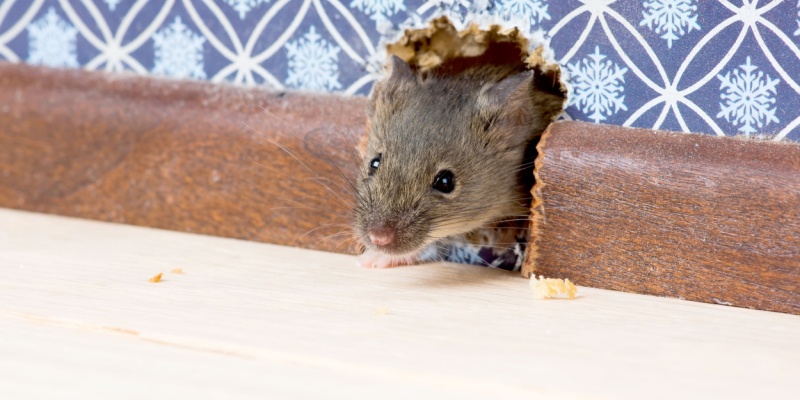Mice are one of the most common pests encountered in homes across the United States, and Henderson, NV, is no exception. With its mix of urban and suburban environments, Henderson provides an inviting habitat for these small, agile rodents. Understanding the prevalence of mouse problems and the factors contributing to their presence can help homeowners take proactive measures to prevent infestations. Let’s explore why mice are a common issue in Henderson homes and what you can do to manage and prevent them effectively.
Why Are Mice a Common Problem in Henderson?
- Favorable Climate: Henderson’s climate, characterized by hot summers and mild winters, can influence the prevalence of mice. While mice are typically more active in the colder months, they are adaptable and can thrive year-round, especially if they find shelter and food in residential areas. The warm weather means that homes with access to food and water are particularly attractive to mice.
- Urban and Suburban Settings: Henderson’s mix of urban and suburban environments creates a variety of conditions that can attract mice. Homes with well-manicured lawns, gardens, and proximity to other buildings can provide ample resources and nesting sites for these rodents. Additionally, urban areas with abundant food sources and shelter can facilitate the spread of mouse populations.
Factors Contributing to Mouse Infestations
- Easy Access to Shelter: Mice are skilled at finding entry points into homes. They can squeeze through small gaps, cracks, and holes, making it relatively easy for them to enter your home. Once inside, they seek out cozy, undisturbed areas to nest, such as attics, basements, and wall voids.
- Availability of Food and Water: Mice are attracted to homes that offer easy access to food and water. They can find nourishment in pantry items, pet food, and even crumbs left on counters or floors. Additionally, any sources of water, such as leaky pipes or spilled liquids, can make a home more appealing to mice.
- Clutter and Poor Maintenance: Cluttered homes with piles of newspapers, boxes, or other items can provide excellent hiding spots for mice. Poor maintenance, such as gaps in foundation or damaged weather stripping, can also make it easier for mice to enter and establish nests within your home.
Signs of a Mouse Problem
- Droppings and Urine: One of the most noticeable signs of a mouse infestation is the presence of droppings and urine stains. Mice leave small, dark droppings scattered around their nesting areas and along their travel routes. Urine stains may also be visible in areas where mice frequently travel.
- Gnaw Marks and Nesting Materials: Mice often chew on various materials to keep their teeth from growing too long. Look for gnaw marks on furniture, wires, and food packaging. Additionally, mice may collect nesting materials such as shredded paper, fabric, or insulation, which can be found in hidden areas of your home.
- Noises and Smells: Mice are nocturnal and are often heard scurrying around in walls, ceilings, or attics during the night. Scratching or squeaking noises can indicate an active infestation. Additionally, a musty or unpleasant odor may be present if mice are nesting in your home.
Health Risks Associated with Mice
- Disease Transmission: Mice can carry and spread various diseases, including hantavirus, leptospirosis, and salmonella. Their droppings, urine, and saliva can contaminate surfaces and food, potentially posing health risks to humans and pets.
- Allergies and Asthma: Mouse droppings and urine can trigger allergic reactions and exacerbate asthma symptoms, particularly in sensitive individuals. Inhaling dust containing mouse allergens can lead to respiratory issues and other health problems.
Preventive Measures and Control
- Seal Entry Points: One of the most effective ways to prevent mice from entering your home is to seal all potential entry points. Inspect your home for gaps, cracks, and holes, and use materials such as steel wool, caulk, or hardware cloth to close off these openings. Pay special attention to areas around pipes, vents, and the foundation.
- Maintain Cleanliness: Keeping your home clean and free of food debris is crucial to preventing mouse infestations. Store food in airtight containers, promptly clean up spills and crumbs, and regularly dispose of garbage. Additionally, ensure that pet food is stored securely and not left out overnight.
- Manage Clutter: Reducing clutter in your home can minimize hiding spots for mice and make it easier to spot any signs of infestation. Regularly organize and clean areas like basements, attics, and garages to eliminate potential nesting sites.
- Use Traps and Baits: If you suspect a mouse problem, using traps and baits can help control the infestation. Snap traps, glue traps, and live traps are common options. Bait stations containing rodenticides can also be effective, but they should be used with caution, especially if you have pets or small children.
- Seek Professional Help: For severe infestations or if DIY methods are not effective, consider seeking help from a professional pest control service. Professionals have the expertise and tools needed to identify the extent of the infestation, implement targeted treatments, and provide ongoing monitoring and prevention strategies.
Pest Raiders Can Eliminate the Mouse Problem
Mice are indeed a common problem for homeowners in Henderson, NV, due to favorable climate conditions, urban and suburban settings, and factors like easy access to shelter and food. By understanding the factors contributing to mouse problems and taking proactive measures, you can significantly reduce the risk of an infestation. Regular maintenance, cleanliness, and prompt action are key to managing and preventing mouse issues in your home. If you find yourself dealing with a mouse problem, don’t hesitate to seek professional assistance from Pest Raiders to ensure a thorough and effective solution.
